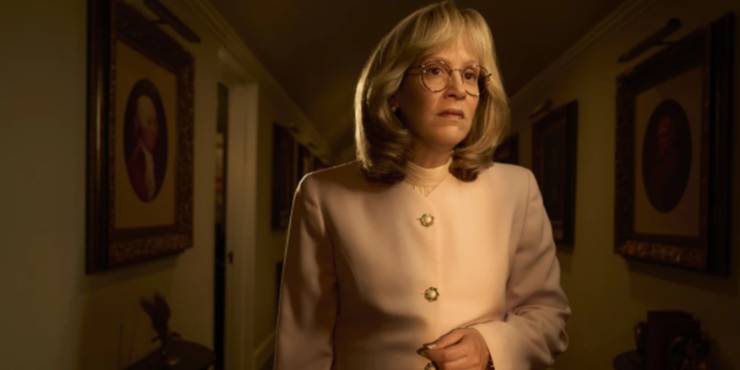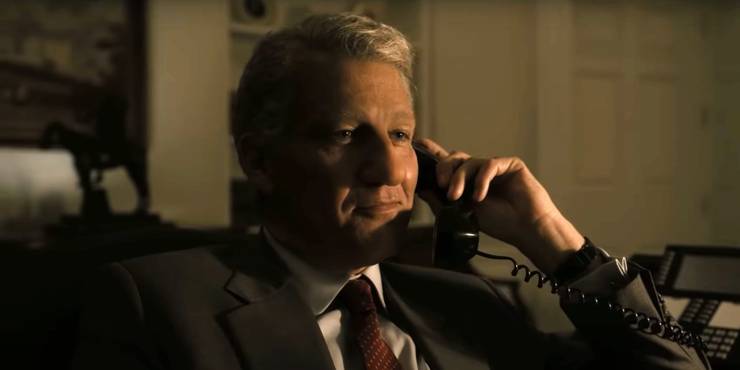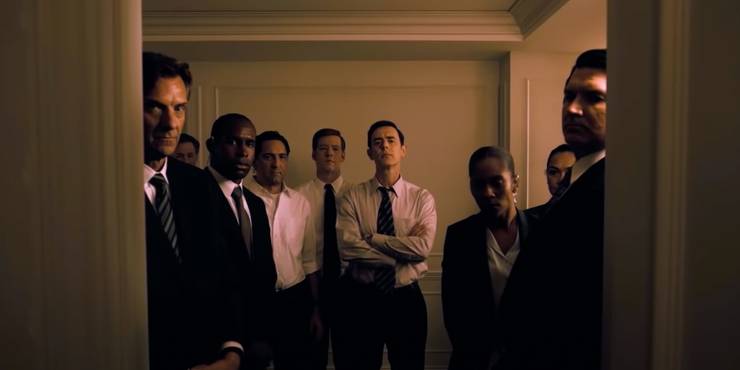Almost every episode of Impeachment: American Crime Story features a title pulled from the text, though all have a deeper meaning to the season’s plot and themes. The 10-episode series is the third season of Ryan Murphy’s anthology TV show American Crime Story, following season 1’s focus on the O.J. Simpson murder trial and season 2’s murder of Gianni Versace. Each season takes an infamous criminal case in recent American history while exposing the underlying problems of U.S. society that scored them, such as racism with season 1, homophobia with season 2, and sexism with season 3.
Impeachment documents the events leading up to the infamous impeachment of President Bill Clinton in 1998, though primarily tells the story from the perspectives of the women who were key players. Much of the conflict focuses on Monica Lewinsky (Beanie Feldstein), her coworker Linda Tripp (Sarah Paulson), and Paula Jones (Annaleigh Ashford), who notably sued Clinton for sexual harassment in 1994. Paired with Clinton already being under investigation for the Whitewater scandal by Independent Counsel and facing numerous sexual harassment allegations, the stories of the three women play major roles in what would become the first presidential impeachment in over a century.
While being placed as the primary focus of Impeachment, the real-life Monica Lewinsky also plays a role behind the scenes as a producer, which finally allows her to reclaim her own story. Show creator Ryan Murphy’s team tells a compelling drama about a sensational event and exposes the darkness of American society from an event not so far back in U.S. history. To underscore the drama that unfolds in each episode, the titles of each installment tell much more about what the episode’s events really mean.
Episode 1, “Exiles”

Both Linda Tripp and Monica Lewinsky are exiled from the White House, which leads to the two striking up an unlikely friendship as coworkers at the Pentagon’s Department of Defense. Linda was “promoted” to a higher paying job at the Pentagon after she sees White House employees removing files about Clinton’s involvement in the Whitewater scandal after her boss Vince Foster’s death. Tripp reveals that being sent to the Pentagon after working in the White House is in no way a promotion, it means being sent away to keep her silent. This sets up that Lewinsky, who had worked as a White House intern and employee for years, being sent to the Pentagon meant she also knew something and was banished. For Lewinsky, she was exiled because people were starting to suspect her relationship with President Clinton and noticing her being around the Oval Office a bit too much. Because of this, Clinton decided to send her away until after the election.
Episode 2, “The President Kissed Me”

The American Crime Story episode title comes from the core reveal where Monica finally confesses to Linda that the man she’s having a relationship with is President Bill Clinton. The episode also goes into flashbacks of how Monica and Bill met, and how their sexual relationship really began after he kissed her. Impeachment’s episode strikes Monica as love-struck with the president, which may suggest that the title is also coming from the classic 1960s song “Then He Kissed Me” by The Crystals. The line is said in American Crime Story’s episode as Monica comes home to her mother and nonchalantly tells her, “Mom, the president kissed me,” to a pretty casual response.
Episode 3, “Not to be Believed”

After Linda Tripp starts to talk about certain aspects of the Clinton administration, she’s branded by the press as someone who is “not to be believed,” and while this line provides the episode’s title, it means a lot more. Women who come forward with claims about sexual harassment or misconduct, especially before the Me Too movement, often have their reputations and pasts ridiculed to the point where they become branded as someone who shouldn’t be believed, which allows the men to carry on without consequences. This was a prime tactic used during the confirmation of Brett Kavanaugh, where Christine Blasey Ford was made into someone that shouldn’t be believed. Following Me Too, the slogan “Believe Women” became popular, which shows just how long women’s complaints and stories have been silenced or disregarded.
Episode 4, “The Telephone Hour”

Playing on the sexual politics of American Crime Story’s season, “The Telephone Hour” literally references Linda recording all of her phone calls with Monica. It also references the song of the same name from the musical Bye, Bye, Birdie in which the characters gossip about one of the girls’ relationships over the phone. The title also comes from Impeachment‘s true story and historical accuracy of Bill Clinton and Monica Lewinsky spending an hour on the telephone for phone sex, hinting at how the relationship between the two has primarily moved to the telephone because they haven’t been able to actually meet and speak since she was banished from the White House.
Episode 5, “Do You Hear What I Hear?”

Coinciding with Impeachment: American Crime Story’s Christmas episode, the rumors of Monica and the president begin to grow, with Linda spilling the beans to journalists and the Paula Jones lawsuit ramping up. Linda finally gives Ken Starr’s office the tapes of her conversations with Monica, leading to more and more gossip around D.C. and progression in the case for impeachment. “Do You Hear What I Hear” comes from the classic Christmas song, and the fact that all of the key players are now exposing information left and right, with all of the wrongdoings of Clinton and those involved coming together for American Crime Story’s climactic impeachment and indictment.
Episode 6, “Man Handled”

Bringing American Crime Story back to the opening scene in the premiere episode, “Man Handled” focuses on the day when Linda Tripp and the office of Independent Counsel conduct their sting on Monica to have her questioned. Again playing on American Crime Story’s sexual politics theme, “Man Handled” comes from how all of the men of Ken Starr’s office are now handling Monica’s situation with aggression, confronting her head-on and attempting to trap her into cooperation. The counsel and FBI agents are trying to manhandle Monica into confessing, using questionable tactics and a bad-cop good-cop technique that fails. This also happens to be the first episode where there are more male characters prominently involved than females, with all of the men who are trying to bring down Clinton focused on attacking Monica.
Episode 7, “The Assassination of Monica Lewinsky”

This is the Impeachment episode when everything falls apart for Monica. While she’s not assassinated in the literal sense as used for the murders of political figures, her entire career and reputation were destroyed by the media and Clinton’s people in this episode. Every detail about her past is exploited and she becomes less of a human being than a figure at the disposal of the American people, leaving Monica Lewinsky a different person than before. American Crime Story’s “The Assassination of Monica Lewinsky” episode shows the heartbreak of what Monica now has to deal with, and how she’s being far more attacked by the press and public than even the president himself.
About The Author




